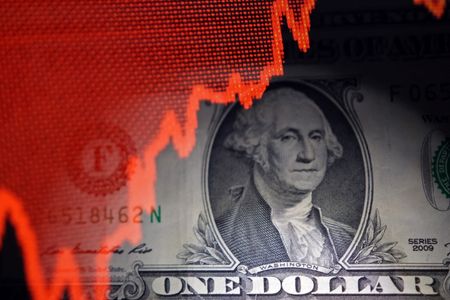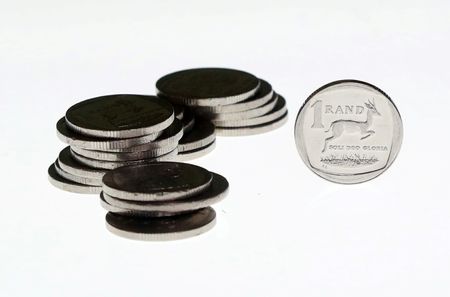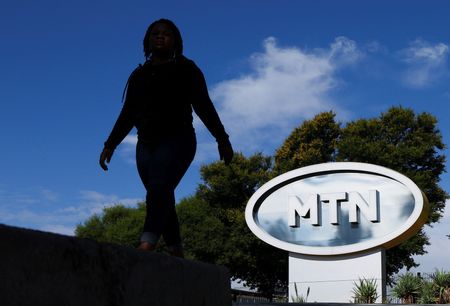By Koh Gui Qing and Naomi Rovnick
NEW YORK/LONDON (Reuters) -Global shares rallied, while gold and safe-haven currencies slumped against a resurgent dollar on Monday as the U.S. and China agreed to temporarily slash harsh reciprocal tariffs and cooperate to avoid rupturing the global economy.
Following weekend talks in Geneva, both sides agreed that the U.S. would drop levies on Chinese imports from 145% to 30% during a 90-day negotiation period and China would cut duties from 125% to 10%.
Wall Street stocks were set for significant daily gains, with the S&P 500 index jumping 3% and the tech-focused Nasdaq Composite advancing 4.1%.
In a joint statement on Monday, Washington and Beijing said they recognised the importance of their bilateral trade relationship to both countries and the global economy, in language that analysts said had brightened the market outlook.
An index tracking the dollar against other major currencies rose further from last month’s three-year trough with an almost 1.25% gain, while Japan’s yen fell 2.2% to 148.48 per dollar.
The retreat from safe-haven assets pushed Switzerland’s franc 1.4% lower on the day, in a jolt of relief for Swiss exporters and the nation’s central bank.
Spot gold prices, which hit an all-time high of $3,500 last month and often move inversely to the dollar, fell 3% to $3,225.3 an ounce.
“This is a textbook recovery after the market’s waterfall declines,” said Gina Bolvin, the president of Bolvin Wealth Management Group in Boston. “The market is blowing through resistance levels and if it sticks, this is a big ‘WIN’ for Trump, for stocks and for investors.”
The euro, which surged in April as investors questioned the dollar’s long-held status as the world’s reserve currency, was 1.2% lower at $1.1113.
‘RELIEF’
Kit Juckes, chief FX strategist at Societe Generale, said the tariff pause was a “substantial relief” for the U.S. and China.
With tariff anxiety having already caused some Chinese exporters to consider their futures, data this weekend showed the nation’s factory-gate prices had dropped by the most in six months in April.
Trump’s erratic trade policies had also sparked fears over U.S. corporate earnings, with investors having entered this week nervous about an impending update from retail giant Walmart after a slew of U.S. multi-nationals pulled their forecasts.
On Monday, however, commodities traders rushed to reassess the recessionary risks of tariff uncertainty, with oil traders pricing Brent crude for delivery next month almost 1.9% higher at $65.10 a barrel, up from around $57 a week ago.
Europe’s regional STOXX 600 was last trading 1.2% higher and Hong Kong’s Hang Seng Index ended the day with an almost 3% gain.
FURTHER TO RUN?
While Trump’s April 2 tariff announcement initially caused world stocks to drop sharply, MSCI’s index of global shares, which is U.S.-dominated, was trading back at levels last seen in late March and was up 1.8%.
Some analysts and investors warned, however, that this was not the end of unpredictable trade talks between the White House and Beijing and that any relief may soon be overshadowed by data showing the U.S. economy had slowed.
Sheldon MacDonald, CIO at British asset manager Marlborough, said that even if the U.S. maintained 30% tariffs on China this was still “negative” for growth, with “no all-clear on recession fears just yet”.
Market pricing at the start of the U.S. morning showed extreme optimism that a trade war with China would be avoided, however, with investors cashing out of traditionally low-risk government debt instruments to load up on stocks.
The 10-year U.S. Treasury yield rose almost 8 basis points on the day, as the price of the government debt fell, with almost identical moves for benchmark German Bunds and British gilts.
But analysts at Citi cautioned Trump supporters may not support a compromise with China and recalled the short-lived trade truce during his first presidency in 2018-2019, when both nations agreed a 90-day tariff halt before tensions resumed.
“It’s going to take some time to get more clarity,” said John Praveen, managing director co-chief investment officer at Paleo Leon in New Jersey. “Until we have a final agreement on both sides, when Trump and Chinese President Xi meet and shake hands, that’s when we will begin to see the blue skies.”
(Additional reporting by Wayne Cole in Sydney and Vidya Ranganathan in Singapore; Editing by Ros Russell and Alex Richardson)












